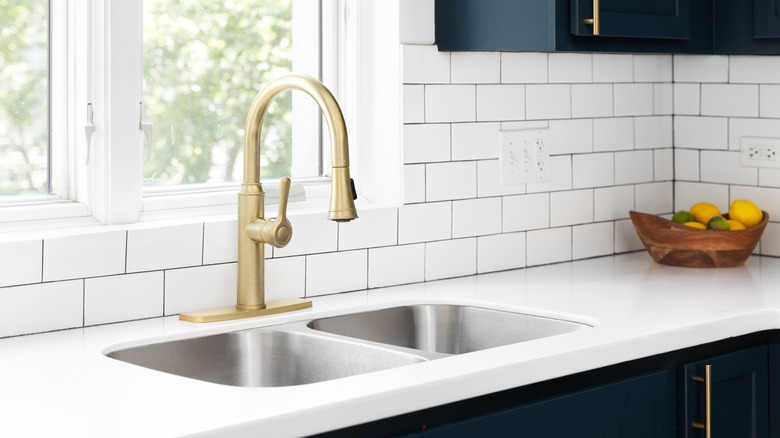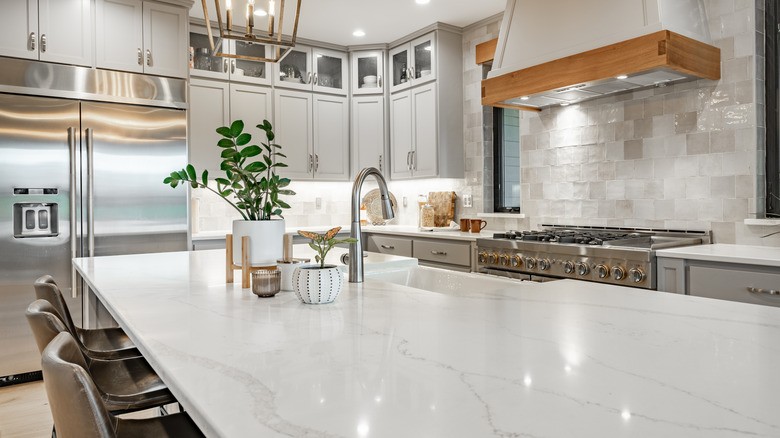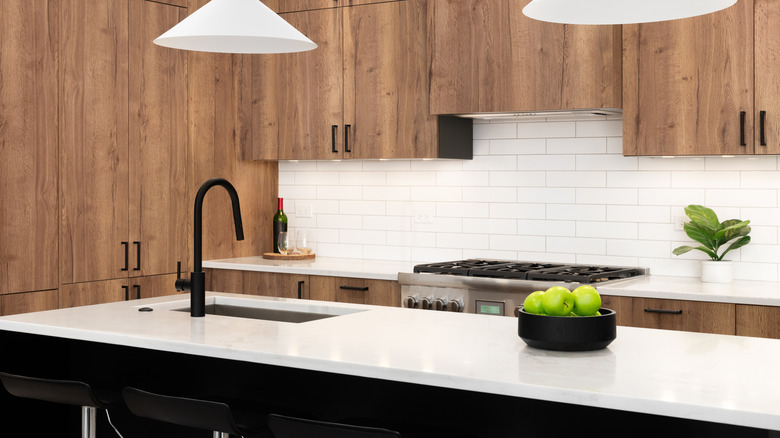What Makes Silestone Quartz Countertops So Special?
We may receive a commission on purchases made from links.
Today's homeowners crave countertops that are not only gorgeous but also environmentally friendly. As it turns out, quartz countertop manufacturing presents challenges both to fabrication facility workers and the environment. The crystalline silica dust that's generated during production can be harmful if you breath it in. Brands like Cosentino recognize this and have chosen to combat the traditional quartz countertop industry by creating mixed-material slabs made of natural quartz and resins, with a focus on lessening the amount of crystalline silica that they use in production. The result is a new and innovative quartz solution that's suitable for an increasingly eco-conscious market.
Silestone quartz is a trademarked countertop by Cosentino. Like other forms of quartz, it's a manufactured composite. However, Cosentino uses its patented Hybriq+ technology to reduce the crystalline silica content in its countertop compositions. Silestone quartz counters are also made of a mix of minerals and recycled materials. According to Cosentino, 85% of surfaces manufactured by the brand contain less than 40% crystalline silica, and 15% of surfaces had less than 10%. Silestone could be setting a new standard for quartz countertops. The product underscores the continuing importance of ethical workplace conditions and environmental responsibility in kitchen design.
Is Silestone quartz a good choice for your countertops?
Cosentino's Silestone quartz is a more unique, sustainable material compared to those utilized by most other popular quartz countertop brands to consider for your home. Aside from their low silica content, Silestone surfaces are produced with 99% reused water and 100% renewable electric energy. Additionally, they're made with a minimum of 20% recycled materials. Other pros of this countertop choice are that it comes in a range of colors and finishes, which makes it versatile enough to suit most kitchen designs. Silestone is also well known for its durability and non-porous, low-maintenance surface.
As with any countertop material, Silestone quartz is not without its drawbacks. Silestone is prone to scratching and denting, as well as heat damage and discoloration. There are many things you should never do if you have quartz countertops, like placing a hot pan directly on the surface, that also apply when you have Silestone. Staining is also a concern, since the resins used in Silestone composition can be damaged if messes are not cleaned up quickly enough. Another issue that some homeowners have encountered is that the seams can discolor if the slabs aren't correctly installed. Make sure your countertop installer has experience working with Silestone to minimize the risk of this occurring.
Comparing Silestone to traditional quartz countertops
Silestone quartz and traditional quartz share many of the same pros and cons. The key difference between the two is the silica content and the fact that quartz is a generic term, while Silestone is a brand of engineered quartz by Cosentino. Both quartz and Silestone are low-maintenance, non-porous, and durable. They each come in a wide array of colors, making them versatile enough to suit all sorts of kitchen designs. Additionally, they share similar drawbacks, such as being prone to scratching, staining, or heat damage.
However, some homeowners have noted that Silestone is sometimes not quite as budget-friendly as traditional quartz. According to Home Depot, generic quartz countertops can range from $59 to $130 per square foot, with an average cost of $80 per square foot. Since many brands use traditional quartz, pricing for surfaces made from this material are more competitive. For comparison, Silestone countertops cost between $60 to $140 per square foot, according to Fynes Designs. Additionally, since Silestone is exclusive to Cosentino, availability could be limited at times. While the difference in cost isn't too significant, it is important to consider, especially if you are planning a kitchen renovation project. Ultimately, Cosentino's shift towards more eco-friendly materials with Silestone could pave the way for future countertop trends that will be huge in the years to come.


